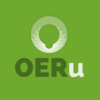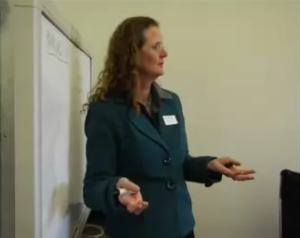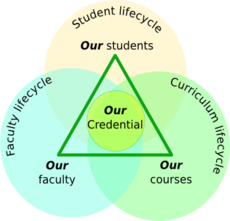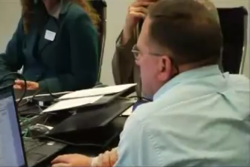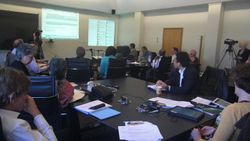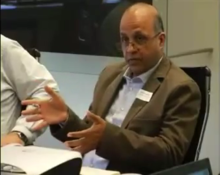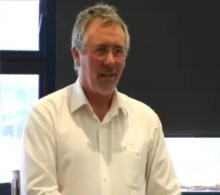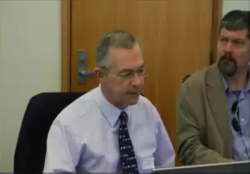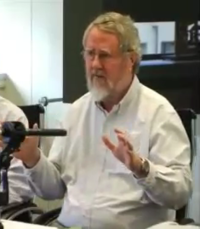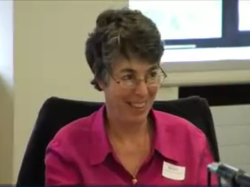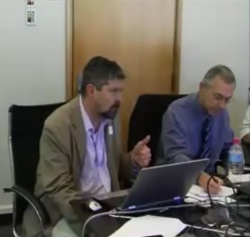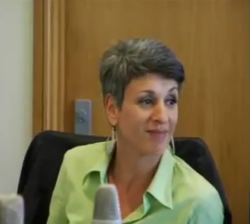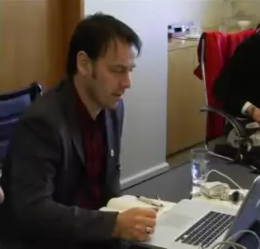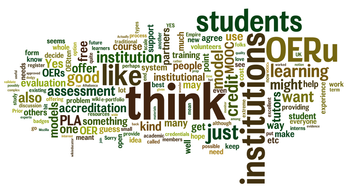2011.11 OERu Meeting summary
| 2011.11 Meeting subpages | |
|---|---|
| OERu 2011.11 | Homepage | Meeting report | Agenda | Virtual participants | Face-to-face participants | Anchor partner statements |
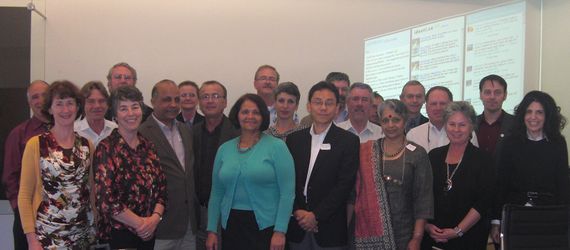
As an open project, all accredited post-secondary institutions may join the OERTen. If you are interested in joining the OERu international partnership, email Wayne Mackintosh, Director of the OER Foundation.
Contents
- 1 OERTen partners join forces in creating the history of sustainable education futures
- 2 Meeting design, processes and open OERu decision-making
- 3 OERTen meeting decisions
- 4 Record of the OERu 2011.11 meeting
- 5 Media
- 6 Media
- 7 Media
- 8 Media
- 9 Media
- 10 Media
- 11 Media
- 12 Media
OERTen partners join forces in creating the history of sustainable education futures
| Founding OERu Anchor Partners |
|---|
See: Founding anchor partner statements |
| “ | "The cast of players at OERu meeting gives this event and its outcomes instant credibility" | ” |
| —Remote Tweet from @dendroglyph | ||
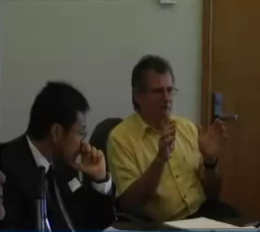
The Dunedin 2011.11 meeting brought together representatives from twelve of the thirteen founding OERu anchor partner institutions comprising colleges, polytechnics and universities from Africa, Asia, North America and Oceania. The founding partners will be recorded in history as the pioneers contributing to opening education to provide free learning opportunities for all students worldwide using courses based solely on OERs combined with pathways for OER learners to achieve credible credentials in the formal post-secondary sector.
The OERu partners are motivated by a clear commitment to providing more affordable education to those learners currently excluded from the formal education system in a financially sustainable way. This is evident in the collection of founding anchor partner statements. Drawing on the depth of collective experience in open learning, technology mediated pedagogies and recognition of prior learning within the OERu network, the meeting was able to cover considerable ground in achieving its planning objectives. The partners have now agreed the inaugural credential and commenced planning for the prototype course(s) to be trialled in 2012.
The network will adopt a strategy innovation approach informed by the following principles of engagement:
- Keep the OERu model open, transparent and simple;
- OERu courses will prioritise the reuse and remix of existing OER;
- OERTen partners retain institutional autonomy for core services including assessment and credentialing within the institution's accepted quality frameworks;
- Partners are free to determine their own price points within local markets for the services provided under the OERu network and identified courses and credentials.
- Focus on strategic collaboration, namely the areas where a networked approach will save time and cost in realising the goals of the OERu;
- Build on existing policy frameworks and practices as agile and incremental development will achieve greater success for the collective.
The OERu anchor partners have affirmed that the model is a low cost, low risk but high impact innovation partnership because: partner institutions do not need to invest new money; recurrent costs for providing assessment and credentialing services will be recouped on a fee-for-service basis (or alternate revenue sources); and OERTen partners will reduce the capital costs of course development by reusing existing OERs (see 5 Things you should know about the OER university network plan![]() ). The OERu partners are collaborating to implement a viable and sustainable education model to widen access to higher education for those learners excluded from the formal system.
). The OERu partners are collaborating to implement a viable and sustainable education model to widen access to higher education for those learners excluded from the formal system.
Meeting design, processes and open OERu decision-making
The open and transparent planning model used by the OER Foundation encourages contributions from all institutions and educators worldwide with final decision-making authority for the OERu vesting with the OERTen anchor partners. BCcampus, based in British Columbia in Canada, has provided sterling support collaborating with the OER Foundation to prepare for the OERu 2011.11 meeting. A consultative online SCoPE seminar for designing OERu credentials was conducted in August 2011. BCcampus prepared a summary of the community recommendations for the inaugural OERu credential![]() for consideration by the OERTen members. This resource was used a key input for the anchor partner decisions.
for consideration by the OERTen members. This resource was used a key input for the anchor partner decisions.
UNESCO's financial support for streaming the meeting live on the Internet has enabled the OER Foundation to integrate synchronous activities for inclusive and open planning of the OERu. Moreover, the recordings combined with open documentation are available for all countries who could not attend the meeting due to timezone differences or locations with unreliable or expensive Internet access.
Visualising open learning 2.0 and the OERu
At Thompson Rivers University’s Open Learning Division (TRU) we conceptualized open education through three lifecycles: a student lifecycle (from inquiry through to alumni), a faculty lifecycle (from first hire through to retirement or resignation) and a curriculum lifecycle (from idea through maintenance and/or closure). Where these three lifecycles intersect is where learning occurs, that is when we have a TRU student working with TRU courseware and being supported by a TRU faculty member. This learning is then subjected to TRU assessment for TRU credit and ultimately, a TRU credential. TRU refers to this as the "traditional model" of open learning. In this traditional model we have Our (insert the name of any institution here) students, using Our courseware, supported by Our faculty, to take Our assessments, to receive Our credentials. (See Figure 1).
To date, the focus of the OER movement has been on taking Our courseware and learning resources and making them freely available on the web for anyone to use including other institutions, students and self-learners. This approach has focused on content and minimal cross-institutional collaboration. There is now a growing movement toward reuse of OERs, building service models around open content, the recognition of learning achieved through OERs and incorporating peer collaboration models when assembling courses from existing OERs.
In thinking about the next evolution of open learning, TRU Open Learning has conceptualized a new model for open education. In keeping with our outcomes based philosophy of higher education we can envision a truly open model for higher education. Judith Murray refers to this new model as "Open Learning 2.0". The conceptual framework for "Open Learning 2.0" requires us to think not only in terms of the "Traditional Model", but in addition to envision a parallel model where we can have Any learner, using Any material, and being supported (taught, instructed, facilitated, mentored, tutored) by Anyone, to achieve learning which is then subjected to Our assessment, in order to receive Our credit, which can be applied towards Our credential. (See Figure 2.)
Technology for open and transparent engagement
| “ | I can feel the buzz in the room in Dunedin, NZ. Let the Genie out of the bottle! | ” |
| —Remote Tweet from @dendroglyph | ||
|
The OER Foundation subscribes to open philanthropy, open governance of its flagship projects and radically transparent planning processes as a matter of policy. Conducting an open international planning meeting requires thoughtful design and support from committed partners like BCcampus, volunteers from Otago Polytechnic and UNESCO who provided funding support for the live web stream. In this way hundreds of interested people from +40 countries could engage actively in the decision-making process. Moreover, these open meetings provide authentic professional development opportunities in open practices and the resources are distributed for asynchronous access under open licenses for reuse around the world.
All planning for the OERu is developed openly in WikiEducator. An Archive of the #OERu steams has been posted on WikiEducator. The international open education community can continue to follow developments by joining the OERu on Google groups. The plenary sessions for the OERu 2011.11 meeting were streamed live from the Dunedin venue. A combined display of the Ustream chat, and feeds from Twitter and identi.ca was projected live for the face-to-face participants. Jim Tittsler, Lead Software Engineer of the OER Foundation, monitored and participated in the #OERu backchannel discussions. A number of Dunedin attendees also interacted with the virtual participants using this microblog link. BCcampus provided technical support for Etherpad documents, an open source collaborative editing environment. These documents were used by virtual participants during the breakout sessions considering the same questions as their Dunedin counterparts. The outputs of these documents were relayed back to the meeting and will be used as a resource for the continued planning for the OERu 2012 prototypes. |
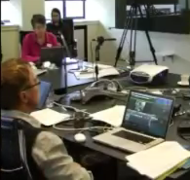 Peter Brook (foreground), from the Educational Development Centre at Otago Polytechnic managing the camera switches filmed by students from newSplash, Otago Polytechnic.
| ||||||||||||||||||
Context, challenges and potential OERu solutions
| “ | "Can't help but wonder if this meeting of #oeru is similar to a meeting that drafts the constitution of a new country" | ” |
| —Local Tweet from @ellen_marie | ||
|
Wayne Mackintosh provided a brief summary on the progress on the OERu initiative since the February meeting which first introduced the OERu Logic Model. The OER Foundation has achieved the critical mass of founding anchor partners necessary for a sustainable model and has exceeded the planned target for the number of founding members by 30%. The OERu initiative has also secured funding support for the planning and design of the model from the William and Flora Hewlett Foundation. The OERu initiative is also attracting wide international interest.
The planning session commenced with a panel which highlighted the OERu challenges, issues and potential solutions. Founding anchor partners and the open community were invited to submit challenges and issues in the wiki prior to the meeting. Virtual participants were encouraged to submit questions for the panel using the microblog backchannel. These issues were discussed by the panel comprising: Professor Narend Baijnath, Pro Vice Chancellor, University of South Africa; Dr Wayne Mackintosh, OER Foundation; Professor Rory McGreal, UNESCO-COL Chair for OER, Athabasca University; Judith Murray, Vice President, Open Learning, Thomson Rivers University and Professor Jim Taylor, AM, University of Southern Queensland. |
| ||||||||||||
Decisions for the inaugural credential, high-level quality model, and seeding ideas for open pedagogy
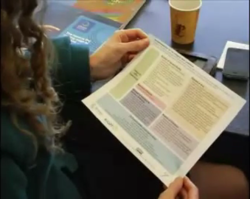
Group 3 in Dunedin, comprising the international governmental agencies and interested anchor partner representatives, considered recommendations for a high-level quality accreditation model for the OERu as an international cross-border initiative. Group 3 affirmed that quality assurance and credible credentials are the foundations on which the OERu will be built. OERTen members must not engage in practices which could jeopardize their stature or accreditation status. The group confirmed that OERTen partners must be accredited institutions within their own jurisdictions, but that this was not sufficient. To facilitate cross-credit within the network, anchor partners will aim to quality assure the courses and open education practices that occur between the course and credential and to agree processes for this purpose. OERTen will reuse and adapt existing tools and procedures, most notably the quality frameworks developed by the European Foundation for Quality in e-Learning (EFQUEL) under the OPAL and OERTest initiatives. Group 3 recommended that the OERTen Commonwealth partners approach the Commonwealth of Learning for guidance and support in adopting and modifying the Transnational Qualifications Framework for the OERu which was developed for the Virtual University of Small States of the Commonwealth.
Professor Jim Taylor AM led the closing session for Day 1 on open pedagogy highlighting examples of the "pedagogy of discovery", e-tivities and e-moderation in preparation for planning of the OERu 2012 prototype scheduled for Day 2. Jim suggests that the OERu should consider opportunities for pedagogical innovation in parallel with technological innovation, rather than using new technologies to embed traditional pedagogy. Jim introduced the concept of "free range learning" where "organic" students have the ability to choose their own learning resources via the "pedagogy of discovery". A second presentation highlighted examples of prototypes the University of Southern Queensland are developing, providing concrete exemplars for anchor partners to consider when planning the assembly of OER courses. The session concluded with a proposal for action to assist with the composition of teams to develop a viable project plan for the 2012 OERu prototype(s).
Planning for the 2012 OERu prototype
| “ | As I listen to this I feel like I want 2 jump up and down & say pick me pick me #oeru :) | ” |
| —Remote tweet from @LMTWR. | ||
The OERu anchor partners will implement an incremental and agile development approach starting with the 2012 prototypes leading to the international launch of the OERu in 2013. This will provide the network with the opportunity to learn and refine its models, approaches and solutions based on the experiences gained from the prototypes. The OERu network aims to undertake a thorough process evaluation in parallel with the development and implementation of the 2012 prototypes. Day 2 of the OERu 2011.11 meeting focused on planning for the prototype. The Dunedin participants self-selected according to their interests and experiences into three groups:
- Group 1: Considered the selection of initial courses and incorporated policy and institutional procedure issues
- Group 2: Focused on "Academic Volunteers international" taking into account scalability issues
- Group 3: Commenced with the development of a master project plan for the 2012 Prototype and ultimate launch of the OERu incorporating opportunities for evaluation of the development plan.
Virtual participants collaborated on a remote proposal for action, hosted by BCcampus on Etherpad, resulting in rich dialogue mirroring many of the proposals and concepts emerging from the anchor partner discussions in Dunedin (see below for virtual participant's proposal for action).
Proposal for Action: OERu 2012 prototype courses
| “ | I tend to agree with Rory McGreal on #oeru pedagogy - seeking to endorse a single model may sidetrack planning & implementation of the OERu | ” |
| —Remote Dent from ablake888 | ||
Group 1 in Dunedin commenced work on developing a proposal for action for the 2012 prototype courses. Discussions leading to the decision for the inaugural OERu credential on Day 1, established a number of useful parameters and guidelines for informing the planning of the 2012 OERu prototype:
- The OERu will focus on courses and models which fit within existing organisational policy and practices of the anchor partners. There is no requirement for founding anchor partners to amend any policies for the implementation of the 2012 prototype or the medium operations of the OERTen. For example, at Empire State College students are required to take a specified number of credits at the institution in order to graduate, whereas at Athabasca University, students can graduate after taking only one course, transferring the balance of credits for the degree from other institutions. Within the OERu partnership, both institutions can participate as enabled by local policies for graduation.
- The OERTen members aim to select courses which can achieve the highest level of cross-credit recognition for course articulation among the partners towards local credentials and / or OERu agreed credential, with the understanding that not all institutions will be able to accredit all OERu courses. However, there is an strong economic incentive to achieve the OERu credit transfer goals because it will maximise reuse of OER course resources to achieve the cost savings associated with collaborative course development.
- OERTen recognises that some anchor partners may not have recognition of prior learning policies in place. In this context, existing practices for course credit transfer will be used, or alternatively the relevant institution could choose not to be listed as an assessment and credential provider to prospective OERu learners for the course concerned. (The OER Foundation will conduct a mini-survey of anchor partners to collect relevant information to inform our planning process regarding the state of play on recognition of prior learning and alternative credit transfer practices.)
The anchor partners noted the interplay among different components of the logic model. For example, local institutional accreditation requirements will be influenced by the overall OERu quality accreditation model to be implemented in the future. During the trial phase, these issues will be addressed on a course-by-course basis as a mechanism to refine practices for the future. Similarly, the mode of delivery will influence how assessment and accreditation services could be offered by each anchor partner. For example, an independent study model using pre-designed e-tivities incorporated into an agreed e-portfolio would be different from a recognition of prior learning model based on a graduate profile using a competency framework and corresponding portfolio assessment. These differences provide OERTen with opportunities for more flexible assessment alternatives in serving OER learners. For this reason OERTen will implement a prototyping approach where solutions will be developed through incremental refinements to ensure a robust assessment model.
The proposal for action for the 2012 prototype courses recommends that the initial courses will be deposited in WikiEducator and configured to facilitate integration into the local institution-hosted LMSs as well as other social networking and open web technology alternatives.
The prototype phase will build in peer-review strategies during the design and development phase to engage all anchor partners in the process. In this way, anchor partners will gain valuable knowledge and experience in the emerging open education and networked collaboration approaches of peer collaboration and OER course assembly for the strategic benefit of all anchor partner institutions.
Anchor partners recommend scholarships for students during the trial phase. The 2012 prototype will be restricted to 100 students for the overall OERu 2012 trial. The scholarships could represent a donation of staff time from anchor partners to oversee assessment services. The anchor partners will aim to waive assessment fees insofar as this is possible or to secure external funding sources to cover the prototype assessment fees or establish mechanisms to share costs among the partners for the number of students to be finalised by the partners. However, students participating in the prototype will gain credit for their learning from the participating institutions. The prototype will enable anchor partners to determine the future resourcing needs and corresponding pricing for assessment services based on real data.
Proposal for Action: Academic Volunteers International
"Academic Volunteers International" is a core activity under the Open Student Support initiative of the the OERu logic model. It aims to develop a financially sustainable and scalable system of support for OERu learners drawing on a gifting culture and a global network of individual philanthropy. A critical mass of interested people donating one hour per week could scale exponentially in a relatively short period of time.
Academic Volunteers International is not intended to replace tuition services offered by traditional institutions, but rather to generate an international social networking space to support OERu learners. Group 2 was tasked to begin developing a proposal for action for this Open Student Support component of the logic model, paying particular attention to ideas for scaling the model for large numbers of students. The notion that "you can't tell volunteers what to do" emerged as a constituting principle for future success and that the model will harness the benefits of self-organisation and open governance approaches.
- Retired academics who could be recruited using an "honour referral" approach;
- Existing academics where community service recognition is integrated into the staff appraisal systems of OERu anchor partners and other formal education institutions for support provided through Academic Volunteers International (Empire State College was cited as an example which already recognize work on OERu as recognised community service contributions);
- Students who participate in community service learning courses where course credit is provided for OERu service hours.
- Students studying education could be required to provide e-moderation services as part of their official course assignment(s) for credit within existing education courses.
- OERu senior students could qualify for rebates or discounts on assessment and credential services from OERu anchor partners in return for providing support through Academic Volunteers International.
- Professional bodies could consider Academic Volunteers International as an option for retaining membership.
- Corporate citizenship models could be designed for businesses to donate staff time to Academic Volunteers International.
- Existing open communities who work in the open education and other related areas.
The group recommended the development of OERs and open capacity building opportunities (similar to WikiEducator's Learning4Content training model) as well as a community badge system to acknowledge levels and experience within a volunteer typology depicting levels of expertise.
The focus on the short term will be for OERu to design the system for Academic Volunteers International and to nurture the development of a critical mass of volunteers needed for self-organisation and scalable growth.
Proposal for Action: Developing a master project plan for the 2012 prototype leading to the implementation of the OERu
| “ | I think we have to have faith in openness. If everyone is transparent about what they are offering and how they are doing it, we stand a good chance of serving the students well. | ” |
| —Virtual participant reflection. | ||
Group 3 in Dunedin commenced work on developing a master project plan to clarify and to develop the levels of participation for the founding anchor partners to provide the necessary inputs to achieve the 2012 OERu prototype objectives leading to the global launch of the OERu in 2013. The project management group aims to integrate a robust evaluation and review process to inform the master project plan.
The project management planning group endorsed the principles of institutional autonomy and context specific applications, taking into account the value of open governance and open project management approaches. The planning group affirmed a number of guidelines including: the need for scalable models, a systems approach for successful collaboration, accountability for active engagement, and the need to reuse existing OER and open education practice resources to avoid reinventing existing wheels.
The project planning group has emphasised the need to develop a system to keep the project moving in a steady timeframe featuring Responsibility / Accountability / Consult / Inform (RACI). (Example provided in the proposal for action. The group recommended an open and transparent project planning process to be coordinated in WikiEducator.
Proposal for Action: OERu virtual participants
| “ | I want to engage in OERU but I have yet to feel I have a full picture of the mission. Today that has changed. Participating in the live podcast and then this Etherpad chat board has made me feel I can constribute and will become active in pursuing that goal. | ” |
| —Virtual participant reflection. | ||
Alternative models for accreditation were highlighted in the discussions. We recommended this discussion as compulsory reading for the OERu planners. The importance of training and some form of "acknowledgement" for academic volunteers surfaced. The virtual team stressed the importance for coordinating volunteer efforts in designing and building the OERu proposals for action and subsequent implementation. The key themes of institutional autonomy in the OERu network mirrored discussions and recommendations from the founding anchor partners. The contribution from volunteers and the gifting culture of educators can facilitate rapid growth of the OERu model.
The virtual team validated the importance of transparency and how this builds faith in the open processes. Open governance, open planning and open philanthropy provides the OERTen with a significant point of difference.
OERTen meeting decisions
| “ | It really is striking how the #OERu virtual community document parallels the discussions here. Seems to be a LOT of common ground. | ” |
| —Dunedin participant Dent from jimt | ||
The inaugural meeting of anchor partners was designed to progress the following initiatives in the logic model: Open Curriculum, Open Pedagogy and Open Student Support as key collaborative components of OERu network. One breakout group considered issues relating to quality assurance and credible credentials. Another team convened to lay the foundations for the overall project plan for implementing the 2012 prototypes on the to the official launch of the OERu in 2013. With reference to delivery and collaborative development technologies, the meeting proposed a wiki-based approach for the 2012 prototype(s) to ensure that the OERu courses integrate with local technologies on campus.
Open curriculum
Inaugural OERu credential and 2012 prototype
|
- The OERTen network will select a small number of courses (for example three or more) at first-year level for the 2012 prototype which:
- could carry credit for a "pre-degree" exit credential (for example the Diploma of Arts at the University of Southern Queensland); and/or
- carry credit towards an existing credential "on the books" of the relevant anchor partner; and/or
- staircase towards an Associate or Bachelor Degree of General Studies / Trans-disciplinary studies for those partner institutions who offer this type of credential.
- will incorporate anchor partner review processes during the development of the prototypes.
- Guiding principles
- Prototype will be limited to a maximum of 100 students or less, spread across the OERTen network to ensure robust assessment.
- Anchor partners will aim to provide scholarships for the assessment of the first trial by donating staff time and/or securing external funding sources, for example supporting 10 students per institution. (Final detail and parameters to be decided).
- Participating anchor partners will assist in recruiting their own students for the 2012 prototype
- Participating anchor partners will assemble courses using existing OERs (rather than creating new OER)
- The OERu network will aim to select courses which maximize credit transfer and recognition of course credits among the anchor partners towards a local institution credential insofar as this is permitted by local policies and regulations including, for instance: Recognition of prior learning, articulation agreements among partners etc. (To maximise return on investment, OERu course resources could be reused and integrated for use "on-campus" with "mainstream" offerings.)
- Anchor partners retain autonomy regarding local articulation requirements (i.e. the maximum number of credits which can be "transferred-in" towards a local institution credential) and local quality requirements for awarding the institution's credential.
- Prototype selection will consider factors relating to the medium to long term sustainability of the courses.
- Courses leading to professional qualifications which are regulated by professional bodies, eg Nursing, professional qualifications for school teachers etc will not be considered during the OERu foundation phases.
- The OERten network will consider collaboration on an elective for a Masters Degree either as one of the 2012 prototype courses or for a later offering, for example, a course on open education (or similar) for a Masters of Education Technology (or similar degree) which could lay the foundations for future OERTen collaborations at postgraduate level. This work could be carried out in parallel with the prototype developments, particularly with the strategic aim to build capacity for the OERu, e.g. a course that includes development of pedagogic knowledge and skills in the application of OER in tertiary education.
Next steps
- OER Foundation to finalize the selection of three courses for the 2012 Prototype in collaboration and consultation with the founding anchor partners by developing decision criteria according to the guiding principles established at the OERu 2011.11 meeting. Target Date: Before the end of 2011.
- OER Foundation to convene the design and implementation of a mini-survey among anchor partners on existing practices and policies for credit transfer and recognition of prior learning as a resource to inform the design of the OERu prototype. Target Date: Before the end of 2011.
- Commence detailed planning of the 2012 OERu Prototype as a sub-activity of the Open Curriculum initiative of the logic model using the OERu 2011.11 proposal for action as the foundation.
Cornerstone of the OERu logic model: Quality assurance and credible credentials
Quality accreditation model for the OERu
- The OERTen partners from Commonwealth member states including Australia, India, New Zealand and South Africa will request the Commonwealth of Learning for guidance and support in adopting and modifying the Transnational Qualifications Framework (TQF) for the OERu network. As an open collaboration using open content licensing, the outputs of this activity will support the larger Commonwealth member states who are not part of the Virtual University for Small States of the Commonwealth to enhance return on investment on the TQF as well as scaling cross-border accreditation for non-Commonwealth partners.
- Guiding principles
- Reuse, adapt and modify existing tools and resources including those developed by the European Foundation for Quality in e-Learning (EFQUEL) under the OPAL and OERTest initiatives.
- OERTen members subscribe to quality processes which will not jeopardize their institutional stature or accreditation status.
- OERTen partners aim to maximise credit transfer for identified courses within the network for local credentials in accordance with existing institutional policy.
- Guiding principles
Next steps
- OER Foundation to approach COL on behalf of OERTen for advice and support on refining the TQF for adoption by the OERTEN
- OER Foundation to approach quality assurance review standards bodies for input into the OERu planning process and to assist with developing a system-wide review and over-arching quality framework exploring the feasibility of a steering group (As noted in the project planning proposal for action).
Open student support
Academic volunteers international
- The OERu will collaboratively develop a detailed framework proposal for "Academic Volunteers International" for consideration and adoption by the OERu anchor partners by 31 December 2011 drawing on the recommendations documented in the proposal for action for Academic Volunteers International.
- The core development team will be convened by Vasi Doncheva (NorthTec) with support from Graham Bell (NMIT), Herbert Thomas (University of Canterbury) and Wayne Mackintosh (OER Foundation).
- The group will encourage wide participation from volunteers in the open community.
- Should an American OERu anchor partner consider an application for the Next Generation Learning Challenge: Wave III request for proposals, the OER Foundation and OERu network will collaborate on components relating to Academic Volunteers International as a strategic element of the OERu ecosystem in an openly licensed proposal.
Next steps
- Convene an online seminar for community and anchor partner inputs into developing a framework proposal for Academic Volunteers International for consideration by OERu anchor partners.
- Commence development of usecase scenarios illustrating how OERu learners might use Academic Volunteers International and the kinds of services which could be provided as a precursor to the evaluation of existing open source technologies for possible implementation by the OERu.
Project management
- Develop and maintain project documentation that clarifies deliverables, ownership and deadlines for the 2012 prototype leading to the international implementation of the OERu in 2013. The OERTen will:
- Appoint a steering committee convened by Kevin Bell with a minimum of three people
- Identify a named liaison person for OERu project management related activities.
- Coordinate and report all project management sensitivities transparently in WikiEducator.
Next steps
- Finalise the composition of the OERu project management team of three people by 30 November 2011.
- Contact all anchor partner institutions to identify liaison people for the project management group by 30 November 2011.
Record of the OERu 2011.11 meeting
Getting started and aims of the meeting
| Welcome and meeting objectives Session 1: OERu context and enablers
Robin acknowledged the Commonwealth of Learning, UNESCO, the William and Flora Hewlett Foundation for their financial support and the UNESCO-COL Chair in OER and Professor Jim Taylor AM for their thought leadership in building the international OERu innovation partnership. Robin summarized the aims of the OERu 2011.11 meeting, namely to:
|
Record of attendance and personal introductions
| Personal introductions from OERu meeting participants in Dunedin Session 1: OERu context and enablers
Senior education leaders, decision-makers and representatives from International Governmental Organisations from six countries representing four continents introduced themselves. Listed in order of the introductions:
|
Meet the OERu Founding Anchor Partners
| OERu Founding Anchor Partner Statements Session 1: OERu context and enablers
Founding anchor partners were invited to prepare anchor partner statements to introduce their organisation, state why they had joined the OERTen and to summarise their institution's anticipated contribution to one or more areas of the “Logic Model” framework. The founding anchor partners are listed in the order of presentation at the meeting below. Each institution is linked to a written version of the anchor partner statement. Athabasca University | BCcampus | BAOU | Empire State College (State University of New York) | Nelson Marlborough Institute of Technology | NorthTec | Open Polytechnic | Otago Polytechnic | Southern New Hampshire University | Thompson Rivers University | University of Canterbury | University of South Africa | University of Southern Queensland | University of Wollongong | OER Foundation |
OERu Context, challenges and potential solutions
| Anchor Partner Panel Session 1: OERu context and enablers
Facilitator: Dr Robin Day (Chair of the OER Foundation Board). Aim: To identify the most important challenges and questions the OERu meeting will need to answer. This session was included to seed ideas for practical solutions and decisions during the meeting. Anchor partners and the community were invited to submit issues and challenges which the OERu network will need to address. These issues were grouped according to three themes:
|
Summary of OERu progress and preparation for breakout groups
| OERu and resources for selecting the inaugural credential and quality accreditation model Session 2: Inaugural credential and quality accreditation model
Wayne Mackintosh provided a summary of OERu progress since the 2011.02 meeting. (Slides can be viewed on Slideshare or download a open file format version)
. |
Community recommendations for the inaugural OERu crendential
| Paul Stacey summarises recommendations from the SCoPE seminar Session 2: Inaugural credential and quality accreditation model
|
Anchor partner recommendations for inaugural OERu credential and quality accreditation model
| Group report back and anchor partner discussions Session 2: Inaugural credential and quality accreditation model
Anchor partners were tasked to consider the community recommendations from the SCoPE seminar for the Inaugural OERu credential
|
Implementation planning for the 2012 OERu prototype
| Session 4: Briefing session for planning groups
Note: Due to technical difficulties with the Ustream client we lost the video feed for this session. However, we were able to record the audio stream.
|
References
- ↑ The text in this subsection was authored by Judith Murray, Vice President of Open Learning, Thompson Rivers University, with minimal edits for the current context
